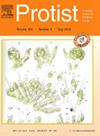Characterizing lineage-specific genes in testate lobose amoebae (Arcellinida)
IF 2.1
3区 生物学
Q4 MICROBIOLOGY
引用次数: 0
Abstract
Arcellinida are an abundant and diverse order of testate (shelled) amoebae that are important bioindicators of changing climates. Despite their ecological importance, the molecular mechanisms that underlie their adaptations, including those involving lineage-specific genes, remain largely unknown. Lineage-specific gene families (LSGFs) are linked to evolutionary innovations, yet the evolution of LSGFs remains underexplored across the tree of life, with most research restricted to model eukaryotes. Here, we assess the evolution of Arcellinida-specific gene families using a set of 197 Arcellinida transcriptomes representing 12 Arcellinida genera. We employ a conservative filtering approach to identify 3424 Arcellinda-specific gene families. Our analyses show that these lineage-specific gene families are shorter and exhibit lower expression compared to more conserved genes, congruent with trends observed in other eukaryotic lineages. Although there are inherent limitations regarding missing data with transcriptomics, we recover substantially more lineage-specific gene family births in the symbiont-bearing species Hyalosphenia papilio compared to Hyalosphenia elegans. Our results demonstrate a method to identify lineage-specific genes in non-model organisms where no reference genome are available, and expand our understanding of the evolution of lineage-specific genes in eukaryotes.
雄性叶状变形虫(Arcellinida)谱系特异性基因的研究
Arcellinida是一种数量丰富、种类多样的有壳变形虫目,是气候变化的重要生物指示物。尽管它们具有重要的生态意义,但它们适应的分子机制,包括那些涉及谱系特异性基因的分子机制,在很大程度上仍然未知。谱系特异性基因家族(LSGFs)与进化创新有关,但LSGFs的进化在整个生命树中仍未得到充分探索,大多数研究仅限于模型真核生物。在这里,我们使用代表12个Arcellinida属的197个Arcellinida转录组来评估Arcellinida特异性基因家族的进化。我们采用保守过滤方法鉴定了3424个arcellinda特异性基因家族。我们的分析表明,与更保守的基因相比,这些谱系特异性基因家族更短,表达量更低,这与在其他真核生物谱系中观察到的趋势一致。尽管转录组学数据缺失存在固有的局限性,但与秀丽透明蝶相比,我们在共生物种中恢复了更多的谱系特异性基因家族出生。我们的研究结果展示了一种在没有参考基因组的非模式生物中鉴定谱系特异性基因的方法,并扩大了我们对真核生物谱系特异性基因进化的理解。
本文章由计算机程序翻译,如有差异,请以英文原文为准。
求助全文
约1分钟内获得全文
求助全文
来源期刊

Protist
生物-微生物学
CiteScore
3.60
自引率
4.00%
发文量
43
审稿时长
18.7 weeks
期刊介绍:
Protist is the international forum for reporting substantial and novel findings in any area of research on protists. The criteria for acceptance of manuscripts are scientific excellence, significance, and interest for a broad readership. Suitable subject areas include: molecular, cell and developmental biology, biochemistry, systematics and phylogeny, and ecology of protists. Both autotrophic and heterotrophic protists as well as parasites are covered. The journal publishes original papers, short historical perspectives and includes a news and views section.
 求助内容:
求助内容: 应助结果提醒方式:
应助结果提醒方式:


